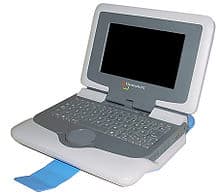Portugal’s 1:1 Initiative Propels PISA Improvement
Portugal, yes recently maligned Portugal, is way out in front of most of these United States in digital learning. On Wednesday at COSN I had breakfast with Mario Franco, President of Portugal’s FCM-Foundation for Mobile Communications and leader of one of the world’s largest and most impressive education technology initiatives.
In 2007, the sale of 3G licenses created a windfall for the government that Prime Minister Jose Socrates decided to use to boost Portugal’s lagging educational performance. He said he wanted Portuguese schools to be “at the frontline of technological change.”
Writing on HuffPost in 2009 Dan Tapscott recounts that “Portugal launched the biggest program in the world to equip every child in the country with a laptop and access to the web and the world of collaborative learning.” Tapscott explained how it works, “If you’re a teacher or a student, you can buy a laptop for 150 euros (U.S. $207). You also get a discounted rate for broadband Internet access, wired or wireless. Low income students get an even bigger discount, and connected laptops are free or virtually free for the poorest kids. For the youngest students in Grades 1 to 4, the laptop/Internet access deal is even cheaper—50 euros for those who can pay; free for those who can’t.”
The Magellan Initiative provides subsidized or free Intel-powered rugged Classmate netbooks for elementary students. The computers are assembled in Portugal and feature an 8.9″ screen, a webcam, and Wi-Fi (see specs for more). There is a clamshell version and a touch slate version.
Magellan Initiative complements Portugal’s e-Escola project, which provides Windows notebooks (ASUS, ACER, Fujitsu, HP, Insys or Toshiba), and Internet access to secondary teachers and students. The UN reports an introductory price of EUR 150 but “Students from low-income households receive the laptop for free, but they have to pay for the broadband service subscription. The laptops are sold through telecommunication operators, which offer a EUR 5 discount off the monthly broadband price, with reduced monthly fees for low income students.”
Franco finds it interesting that the Socialist government in Portugal implemented a parent pay scheme and that many leaders in American can’t imagine doing the same. Interestingly, parents continue to buy textbooks as well as laptops. It’s hard to imagine that will continue for long.
Like Maine, the Portuguese are way out front on 1:1 but they don’t offer much online learning. There is almost no tradition of home education so the idea of full and part time virtual schooling is largely foreign.
The 2009 PISA results indicated that Portugal was the most improved OECD country. Franco attributes much of the increase to the laptop initiative. However, the impact has been much broader. Portugal took advantage of the fact that most homes are connected and have at least one laptop and now leads the world in eGovernment initiatives including improvements health, banking, and tax collection. (See a 2010 Microsoft white paper on benefits of ICT investment that discusses secondary benefits of Protugal’s laptop program.)
Mario invests 20% of his time internationally learning what works and promoting the Portuguese tech initiative. Franco said, “The success of the initiative is based on the engagement of all stakeholders” and that “Political leadership was key.” It’s interesting to note that efforts to implement new teacher evaluations in 2008 where much more controversial than the introduction of laptops.
The Portugal model of subsidized sliding scale hardware and connectivity is a great example for states to consider as they consider development of high access learning environments over the next three years in preparation for and adoption of the Common Core State Standards and online assessments. If Portugal and Turkey can figure this out, leaders of each of these United States should be able to orchestrate the development of 21st century learning environments.






0 Comments
Leave a Comment
Your email address will not be published. All fields are required.